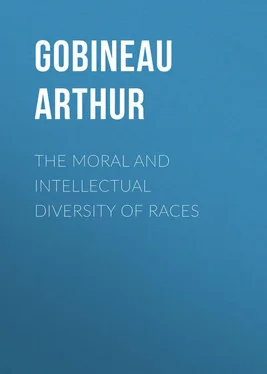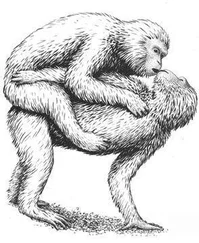Arthur Gobineau - The Moral and Intellectual Diversity of Races
Здесь есть возможность читать онлайн «Arthur Gobineau - The Moral and Intellectual Diversity of Races» — ознакомительный отрывок электронной книги совершенно бесплатно, а после прочтения отрывка купить полную версию. В некоторых случаях можно слушать аудио, скачать через торрент в формате fb2 и присутствует краткое содержание. Жанр: История, foreign_antique, foreign_prose, на английском языке. Описание произведения, (предисловие) а так же отзывы посетителей доступны на портале библиотеки ЛибКат.
- Название:The Moral and Intellectual Diversity of Races
- Автор:
- Жанр:
- Год:неизвестен
- ISBN:нет данных
- Рейтинг книги:4 / 5. Голосов: 1
-
Избранное:Добавить в избранное
- Отзывы:
-
Ваша оценка:
- 80
- 1
- 2
- 3
- 4
- 5
The Moral and Intellectual Diversity of Races: краткое содержание, описание и аннотация
Предлагаем к чтению аннотацию, описание, краткое содержание или предисловие (зависит от того, что написал сам автор книги «The Moral and Intellectual Diversity of Races»). Если вы не нашли необходимую информацию о книге — напишите в комментариях, мы постараемся отыскать её.
The Moral and Intellectual Diversity of Races — читать онлайн ознакомительный отрывок
Ниже представлен текст книги, разбитый по страницам. Система сохранения места последней прочитанной страницы, позволяет с удобством читать онлайн бесплатно книгу «The Moral and Intellectual Diversity of Races», без необходимости каждый раз заново искать на чём Вы остановились. Поставьте закладку, и сможете в любой момент перейти на страницу, на которой закончили чтение.
Интервал:
Закладка:
In the preceding pages, I have endeavored to show that the unity of species is no proof of equal intellectual capability of races, that mental imparities do not conflict with the universality of the gospel tidings, and that the permanency of these imparities is consistent with the reasoning of the greatest expounder of the unity theory. I shall now proceed to state the facts which prove the intellectual diversities among the races of man. In doing so, it is important to guard against an error into which so many able writers have fallen, that of comparing individuals rather than masses.
What we term national character, is the aggregate of the qualities preponderating in a community. It is obvious that when we speak of the artistic genius of the Greeks, we do not mean that every native of Hellas and Ionia was an artist; and when we call a nation unwarlike or valorous, we do not thereby either stigmatize every individual as a coward, or extol him as a hero. The same is the case with races. When, for example, we assert that the black race is intellectually inferior to the white, it is not implied that the most intelligent negro should still be more obtuse than the most stupid white man. The maximum intellect and capacity of one race may greatly exceed the minimum of another, without placing them on an equality. The testimony of history, and the results of philanthropic experiment, are the data upon which the ethnologist must institute his inquiries, if he would arrive at conclusions instructive to humanity.
Let us take for illustration the white and the black races, supposed by many to represent the two extremes of the scale of gradation. The whole history of the former shows an uninterrupted progress; that of the latter, monotonous stagnation. To the one, mankind owes the most valuable discoveries in the domain of thought, and their practical application; to the other, it owes nothing. For ages plunged in the darkest gloom of barbarism, there is not one ray of even temporary or borrowed improvement to cheer the dismal picture of its history, or inspire with hope the disheartened philanthropist. At the boundary of its territory, the ever-encroaching spirit of conquest of the European stops powerless. 9 9 In 1497, Vasco di Gama sailed around Cape Good Hope; even previous to that, Portuguese vessels had coasted along the western shores of Africa. Since that time the Europeans have subjected the whole of the American continents, southern Asia and the island world of the Pacific, while Africa is almost as unknown as it ever was. The Cape Colony is not in the original territory of the negro. Liberia and Sierra Leone contain a half-breed population, and present experiments by no means tested. It may be fairly asserted that nowhere has the power and intelligence of the white race made less impression, produced fewer results, than in the domain of the negro.
Never, in the history of the world, has a grander or more conclusive experiment been tried than in the case of the negro race. We behold them placed in immediate possession of the richest island in the richest part of the globe, with every advantage that climate, soil, geographical situation, can afford; removed from every injurious contact, yet with every facility for constant intercourse with the most polished nations of the earth; inheriting all that the white race had gained by the toil of centuries in science, politics, and morals; and what is the result? As if to afford a still more irrefragable proof of the mental inequality of races, we find separate divisions of the same island inhabited, one by the pure, the other by a half-breed race; and the infusion of the white blood in the latter case forms a population incontestably and avowedly superior. In opposition to such facts, some special pleader, bent upon establishing a preconceived notion, ransacks the records of history to find a few isolated instances where an individual of the inferior race has displayed average ability, and from such exceptional cases he deduces conclusions applicable to the whole mass! He points with exultation to a negro who calculates, a negro who is an officer of artillery in Russia, a few others who are employed in a counting-house. And yet he does not even tell us whether these raræ aves are of pure blood or not, as is often the case. 10 10 Roberts, the president of the Liberian Republic, boasts of but a small portion of African blood in his veins. Sequoyah, the often-cited inventor of the Cherokee alphabet, so far from being a pure Indian, was the son of a white man.
Moreover, these instances are proclaimed to the world with an air of triumph, as if they were drawn at random from an inexhaustible arsenal of facts, when in reality they are all that the most anxious research could discover, and form the stock in trade of every declaimer on the absolute equality of races.
Had it pleased the Creator to endow all branches of the human family equally, all would then have pursued the same career, though, perhaps, not all with equal rapidity. Some, favored by circumstances, might have distanced others in the race; a few, peculiarly unfortunately situated, would have lagged behind. Still, the progress of all would have been in the same direction, all would have had the same stages to traverse. Now is this the case? There are not a few who assert it. From our earliest infancy we are told of the savage, barbarous, semi-civilized, civilized, and enlightened states. These we are taught to consider as the steps of the ladder by which man climbs up to infinite perfection, we ourselves being near the top, while others are either a little below us, or have scarcely yet firmly established themselves upon the first rounds. In the beautiful language of Schiller, these latter are to us a mirror in which we behold our own ancestors, as an adult in the children around him re-witnesses his own infancy. This is, in a measure, true of nations of the same race, but is it true with regard to different races? It is little short of presumption to venture to combat an idea perhaps more extensively spread than any of our time, yet this we shall endeavor to do. Were the differences in civilization which we observe in various nations of the world, differences of degree only, and not of kind, it is obvious that the most advanced individual in one degree must closely approach the confines of a higher. But this is not the case. The highest degree of culture known to Hindoo or Chinese civilization, approaches not the possessor one step nearer to the ideas and views of the European. The Chinese civilization is as perfect, in its own way, as ours, nay more so. 11 11 For the great perfection to which the Chinese have carried the luxuries and amenities of life, see particularly M. Huc's Travels in China . He lived among them for years, and, what few travellers do, spoke their language so fluently and perfectly that he was enabled, during a considerable number of years, to discharge the duties of a missionary, disguised as a native.
It is not a mere child, or even an adult not yet arrived at maturity; it is rather a decrepit old man. It too has its degrees; it too has had its periods of infancy, of adult age, of maturity. And when we contemplate its fruits, the immense works which have been undertaken and completed under its ægis, the systems of morals and politics to which it gave rise, the inventions which signalized its more vigorous periods, we cannot but admit that it is entitled in a high degree to our veneration and esteem. 12 12 It would be useless to remind our readers of the famous Great Wall, the Imperial Canals, that largest of the cities of the world – Pekin. The various treatises of the Chinese on morals and politics, especially that of Confucius, have been admired by all European thinkers. Consult Pauthier's elaborate work on China. It is equally well known that the Chinese knew the art of printing, gunpowder and its uses, the mariner's compass, etc., centuries before we did. For the general diffusion of elementary knowledge among the Chinese, see Davis's Sketches , and other authors. Those who may think me a biassed panegyrist of the Chinese, I refer to the following works as among the most reliable of the vast number written on the subject: — • Description Historique, Géographique, et Littéraire de la Chine. Par M. G. Pauthier. Paris, 1839. • China Opened. By Rev. Chs. Gutzlaff. London, 1838. • China, Political, Commercial, and Social. By R. Montgomery Martin. London, 1847. • Sketches of China. By John F. Davis. London, 1841. And above all, for amusing and instructive reading, • Journey through the Chinese Empire. By M. Huc. New York, 1855; and • Mélanges Asiatiques. Par Abel Remusat. Paris, 1835.
Moreover it has excellencies which our civilization as yet has not; it pervades all classes, ours not. In the whole Chinese empire, comprising, as it does, one-third of the human race, we find few individuals unable to read and write; in China proper, none. How many European countries can pretend to this? And yet, because Chinese civilization has a different tendency from ours, because its course lies in another direction, we call it a semi-civilization. At what time of the world's history then have we – the civilized nations – passed through this stage of semi-civilization?
Интервал:
Закладка:
Похожие книги на «The Moral and Intellectual Diversity of Races»
Представляем Вашему вниманию похожие книги на «The Moral and Intellectual Diversity of Races» списком для выбора. Мы отобрали схожую по названию и смыслу литературу в надежде предоставить читателям больше вариантов отыскать новые, интересные, ещё непрочитанные произведения.
Обсуждение, отзывы о книге «The Moral and Intellectual Diversity of Races» и просто собственные мнения читателей. Оставьте ваши комментарии, напишите, что Вы думаете о произведении, его смысле или главных героях. Укажите что конкретно понравилось, а что нет, и почему Вы так считаете.












